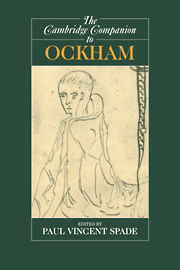Book contents
- Frontmatter
- Introduction
- 1 The Academic and Intellectual Worlds of Ockham
- 2 Some Aspects of Ockham's Logic
- 3 Semantics and Mental Language
- 4 Is There Synonymy in Ockham's Mental Language?
- 5 Ockhams' Nominalist Metaphysics
- 6 Ockham's Semantics and Ontology of the Categories
- 7 Ockham's Philosophy of Nature
- 8 The Mechanisms of Cognition
- 9 Ockham's Misunderstood Theory of Intuitive and Abstractive Cognition
- 10 Ockham's Ethical Theory
- 11 Ockham on Will, Nature, and Morality
- 12 Natural Law and Moral Omnipotence
- 13 The Political Writings
- 14 Ockham on Faith and Reason
- 15 Ockham's Repudiation of Pelagianism
- Bibliography
- Citations
- Index
11 - Ockham on Will, Nature, and Morality
Published online by Cambridge University Press: 28 May 2006
- Frontmatter
- Introduction
- 1 The Academic and Intellectual Worlds of Ockham
- 2 Some Aspects of Ockham's Logic
- 3 Semantics and Mental Language
- 4 Is There Synonymy in Ockham's Mental Language?
- 5 Ockhams' Nominalist Metaphysics
- 6 Ockham's Semantics and Ontology of the Categories
- 7 Ockham's Philosophy of Nature
- 8 The Mechanisms of Cognition
- 9 Ockham's Misunderstood Theory of Intuitive and Abstractive Cognition
- 10 Ockham's Ethical Theory
- 11 Ockham on Will, Nature, and Morality
- 12 Natural Law and Moral Omnipotence
- 13 The Political Writings
- 14 Ockham on Faith and Reason
- 15 Ockham's Repudiation of Pelagianism
- Bibliography
- Citations
- Index
Summary
Among other things, Ockham is notorious for his doctrine of the liberty of indifference: the notion that created willpower is power to will, to nill, or to do nothing with respect to any object. By contrast with his great medieval predecessors, many estimate, Ockham has staked out a position fraught with disadvantages. First, it cuts will off from nature. The liberty of indifference turns created wills into neutral potencies unshaped by natural inclinations. Second, it “frees” will from reason's rule: no matter what reason dictates, created willpower can disobey.
To some, such consequences have seemed momentous for ethics because they are inconsistent with a kind of naturalism. For example, Maurer writes that
the scholastics prior to Ockham looked upon goodness as a property of being. Saint Thomas, for example, speaks of goodness as the perfection of being that renders it desirable. Because God is all-perfect and supremely desirable, he is supremely good. A creature is good to the extent that it achieves the perfection demanded by its nature. Moral goodness consists in man’s acting in accordance with his nature, with a view to attaining his final end (happiness), which is identical with the perfection of his being. For Saint Thomas, therefore, morality has a metaphysical foundation, and it links man with God, giving him a share in the divine goodness and perfection.
Ockham, on the other hand, severs the bond between metaphysics and ethics and bases morality not upon the perfection of human nature (whose reality he denies), nor upon the teleological relation between man and God, but upon man’s obligation to follow the laws freely laid down for him by God.
- Type
- Chapter
- Information
- The Cambridge Companion to Ockham , pp. 245 - 272Publisher: Cambridge University PressPrint publication year: 1999
- 22
- Cited by

